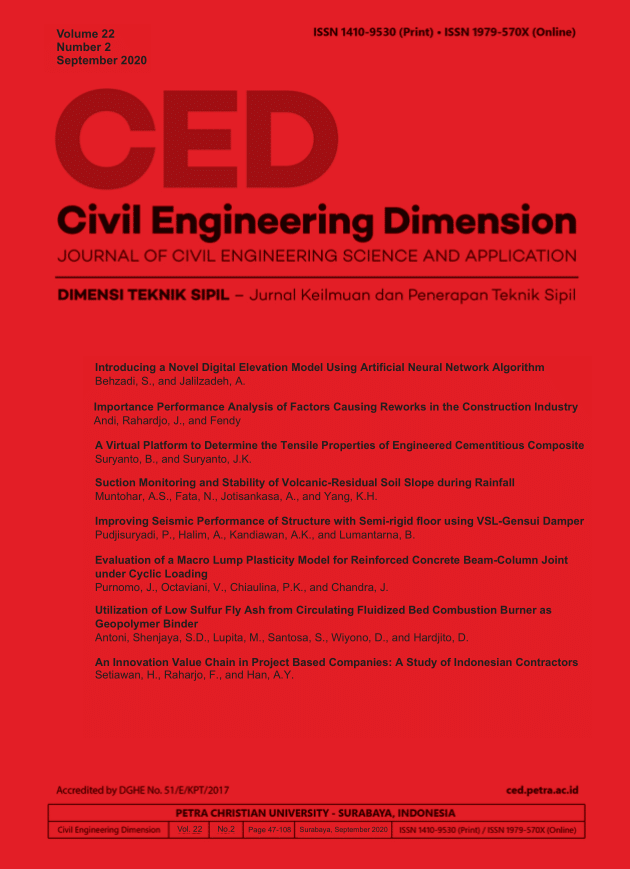An Innovation Value Chain in Project Based Companies: A Study of Indonesian Contractors
DOI:
https://doi.org/10.9744/ced.22.2.98-104Keywords:
Innovation Value Chain, Contractors, IndonesiaAbstract
Innovation is one of the key success factors of contractors to achieve sustainable business. However, studies about innovation cannot be generalized to all business sectors. Therefore, special study about innovation that focuses on contractors in Indonesia is needed. The study is aimed to explore the process of innovation development in contractors, based on innovation value chain (IVC) approach. The qualitative analysis on the data that is collected from in depth interview with top managers of big contractors in Indonesia is carried out. This study found that innovations are generated mainly by project teams because they are involved directly in the project activities. The next phase is to test the idea of innovation in the selected projects in order to assess whether the innovation works well or not. Finally, the selected innovations will be set as a company standard and will be implemented in the subsequent projects.
References
Blindenbach-Driessen, F., & van den Ende, J. (2006). Innovation in Project-Based Firms: the Context Dependency of Success Factors. Research Policy, 35(4), 545-561. doi:http://www.elsevier.com/wps/find/journaldescription.cws_home/505598/description#description
Bosch-Sijtsema, P. M., & Postma, T. J. B. M. (2009). Cooperative Innovation Projects: Capabilities and Governance Mechanisms. Journal of Product Innovation Management, 26(1), 58-70. doi:10.1111/j.1540-5885.2009.00334.x
Braun, V., & Clarke, V. (2006). Using Thematic Analysis in Psychology. Qualitative Research in Psychology, 3(2), 77-101. doi:10.1191/1478088706qp063oa
Bryman, A., & Bell, E. (2011). Business Research Methods (3rd ed.). Oxford: Oxford University Press.
Frenz, M., & Oughton, C. (2005). Innovation in the UK regions and devolved administrations : a review of the literature Retrieved from London: http://www.dti.gov.uk/iese/DTI_regional_innovation_review2.doc
Gann, D. M., & Salter, A. J. (2000). Innovation in Project-Based, Service-Enhanced Firms: the Construction of Complex Products and Systems. Research Policy, 29, 955-972. doi:10.1016/s0048-7333(00)00114-1
Gould, F. E., & Joyce, N. E. (2009). Construction Project Management (3rd ed. ed.): Pearson Prentice-Hall.
Halpin, D. W., & Woodhead, R. W. (2011). Construction Management (2nd ed.). New York: Wiley.
Hansen, M. T., & Birkinshaw, J. (2007). The Innovation Value Chain. Harvard Business Review, 85(6), 121-130.
Nam, C. H., & Tatum, C. B. (1997). Leaders and Champions for Construction Innovation. Construction Management & Economics, 15(3), 259-270. doi:10.1080/014461997372999
OECD/Eurostat. (2018). Oslo Manual 2018: Guidelines for Collecting, Reporting and Using Data on Innovation, 4th Edition. Paris/Eurostat, Luxembourg: OECD Publishing.
Ozorhon, B., Abbott, C., & Aouad, G. (2009). Innovation value chain in construction. Paper presented at the Managing Construction for Tomorrow, Istanbul, Turkey.
Ozorhon, B., Abbott, C., Aouad, G., & Powell, J. (2010). Innovation in Construction A Project Life Cycle Approach (Vol. 4). Salford, England: Salford Centre for Reserach & Innovation.
Quinlan. (2011). Business Research Methods: Cengage.
Ritz, G. J. (1994). Total Construction Project Management. USA: McGraw-Hill.
Roper, S., Du, J., & Love, J. H. (2008). Modelling the innovation value chain. Research Policy, 37(6-7), 961-977.
Saunders, M., Lewis, P., & Thornhill, A. (2012). Research Methods for Business Students (6th ed.): Pearson.
Silverman, D. (2011). Intrepreting Qualitative Data (4th ed.). London: Sage Publications Ltd.
Wilson, R. (2007). Innovation in London. Retrieved from London:
Downloads
Published
How to Cite
Issue
Section
License
Authors who publish with this journal agree to the following terms:- Authors retain the copyright and publishing right, and grant the journal right of first publication with the work simultaneously licensed under a Creative Commons Attribution License that allows others to share the work with an acknowledgement of the work's authorship and initial publication in this journal.
- Authors are able to enter into separate, additional contractual arrangements for the non-exclusive distribution of the journal's published version of the work (e.g., post it to an institutional repository or publish it in a book), with an acknowledgement of its initial publication in this journal.
- Authors are permitted and encouraged to post their work online (e.g., in institutional repositories or on their website) followingthe publication of the article, as it can lead to productive exchanges, as well as earlier and greater citation of published work (See The Effect of Open Access).











